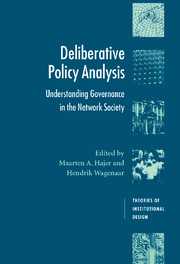Book contents
- Frontmatter
- Contents
- List of contributors
- List of figures
- List of tables
- Preface
- Introduction
- Part I Policy conflict and deliberation in the network society
- 1 Collaborative policymaking: governance through dialogue
- 2 Place, identity and local politics: analysing initiatives in deliberative governance
- 3 A frame in the fields: policymaking and the reinvention of politics
- Part II Rethinking policy discourse
- Part III Foundations of deliberative policy analysis
- References
- Subject index
- Author index
1 - Collaborative policymaking: governance through dialogue
Published online by Cambridge University Press: 22 September 2009
- Frontmatter
- Contents
- List of contributors
- List of figures
- List of tables
- Preface
- Introduction
- Part I Policy conflict and deliberation in the network society
- 1 Collaborative policymaking: governance through dialogue
- 2 Place, identity and local politics: analysing initiatives in deliberative governance
- 3 A frame in the fields: policymaking and the reinvention of politics
- Part II Rethinking policy discourse
- Part III Foundations of deliberative policy analysis
- References
- Subject index
- Author index
Summary
The Sacramento Water Forum, a group of contentious stakeholders from environmental organizations, business, local government and agriculture, spent five years in an intensive consensus-building process. In 1999 they agreed on a strategy and procedures for managing the limited water supply in northern California's semi-desert. Leaders in the region were sufficiently impressed to set up a similar collaborative policy dialogue around the equally volatile issues of transportation and land use in this fast-growing region. When environmental groups decided to sue the regional transportation agency for not protecting the region's air quality, the business community was ready to pull out of this nascent policy dialogue. They were stopped by a leading businessman and elected official who had been involved in the Water Forum and influenced by this way of working. He told the other business leaders in an eloquent speech, ‘We have no choice. We have to stay at the table. There is no alternative.’ They accused him of being ‘one of them’, suggesting he had crossed over to the environmentalist side. This businessman told them they were wrong, saying ‘The Water Forum process transformed me. I now understand that collaboration is the only way to solve problems. I do it now in everything I do, including running my business and dealing with my suppliers, employees and customers.’ The business community stayed with the process and consensus building around transportation got underway.
The Water Forum is not unique. A collaborative group known as CALFED, including nineteen state and federal agencies with jurisdiction over California water and dozens of competing stakeholder groups, has been at work since 1995 to resolve issues over the management of California's limited and irregular water supply.
- Type
- Chapter
- Information
- Deliberative Policy AnalysisUnderstanding Governance in the Network Society, pp. 33 - 59Publisher: Cambridge University PressPrint publication year: 2003
- 227
- Cited by

